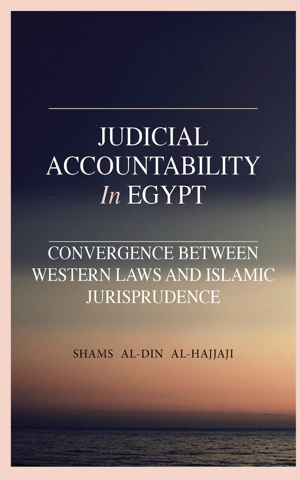
Judicial Accountability in Egypt: Convergence between Western Laws and Islamic Jurisprudence
Author: Dr. Shams Al-Hajjaji
Publisher: Luxembourg University Press
Publication Date: Mar 16, 2022
ISBN: 978-99959-0-735-8
Language: en
Keywords: Judicial Accountability, Egyptian Judiciary, Islamic Jurisprudence, Comparative Constitutional Law, Judicial Reform,
Abstract
Abstract
This book investigates the evolving landscape of judicial accountability in Egypt by exploring the intersection between Western legal frameworks and Islamic jurisprudential thought. Using a comparative approach, the study critically examines how judicial appointment, independence, and disciplinary processes operate within Egypt’s legal system, and how they diverge from or align with models in the United States, United Kingdom, France, and Germany. The research integrates legal history, doctrinal analysis, and Islamic legal theory to trace the institutional, political, and religious forces shaping judicial accountability. In doing so, the book sheds light on the Egyptian judiciary’s structure and its challenges, including politicization, lack of transparency, and the uneasy coexistence of secular and religious legal norms. It concludes by offering practical reforms aimed at achieving a balanced model of accountability that respects both democratic principles and Islamic legal heritage.
Description
Judicial Accountability in Egypt offers a compelling exploration of how Egypt’s judiciary is held to account—both in theory and practice—within a hybrid legal system shaped by Islamic tradition and Western law. Drawing on years of academic research and firsthand experience within Egypt’s judiciary, the author unpacks the historical formation of Egypt’s courts, the socio-political motivations for reform, and the tensions between independence and oversight. The book also provides a rare comparative lens, situating Egypt’s legal struggles alongside global standards. With deep analysis of Islamic legal concepts such as Wilayat al-Qadi and Wilayat al-Faqih, and an examination of how judicial power has been shaped by regimes from Nasser to Sisi, this work is essential reading for scholars of constitutional law, Middle Eastern legal systems, and judicial reform. It speaks equally to academics, practitioners, and policymakers seeking a nuanced understanding of legal accountability in hybrid legal orders.
Author biography
Dr. Shams Al-Hajjaji is a legal scholar and former judge in Egypt, specializing in constitutional law, judicial systems, and Islamic jurisprudence. He holds a Ph.D. in Constitutional Law from the University of Luxembourg and a J.S.D. in Environmental Law from the University of California, Berkeley School of Law. Dr. Al-Hajjaji has taught law at several international institutions, including Tilburg University, the British University in Dubai, and the University of Kiel. He is currently the Executive Director of Luxembourg University Press and coordinates the Ocean Justice Research and Training Group. His research bridges Western and Islamic legal traditions with a focus on judicial reform, human rights, and governance in the Middle East and North Africa.
